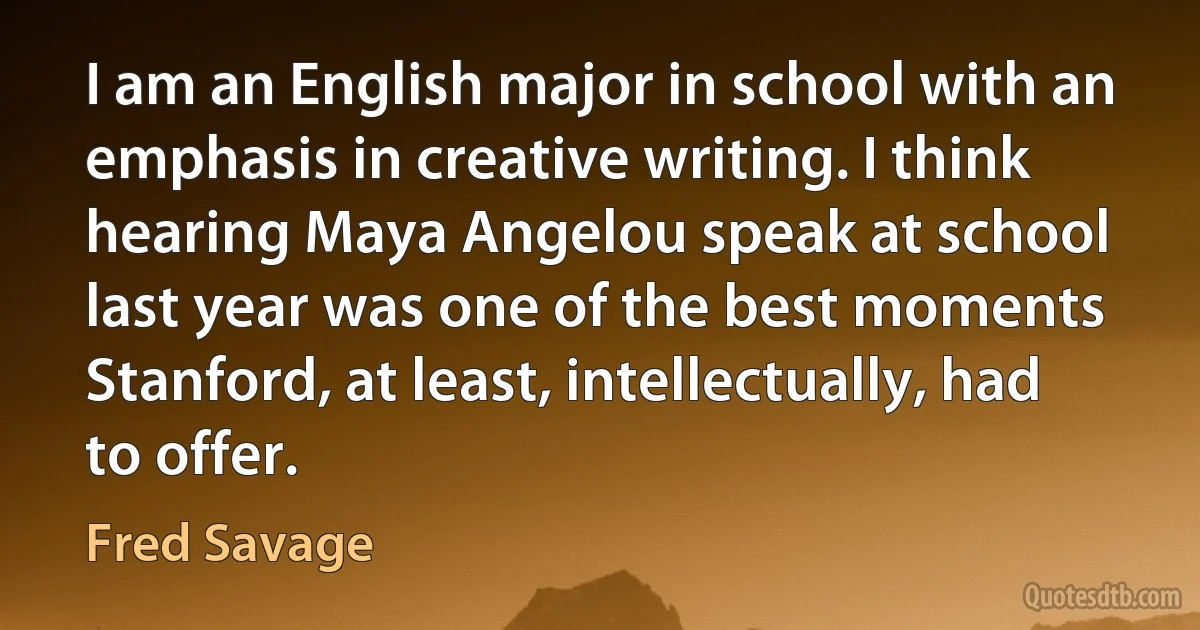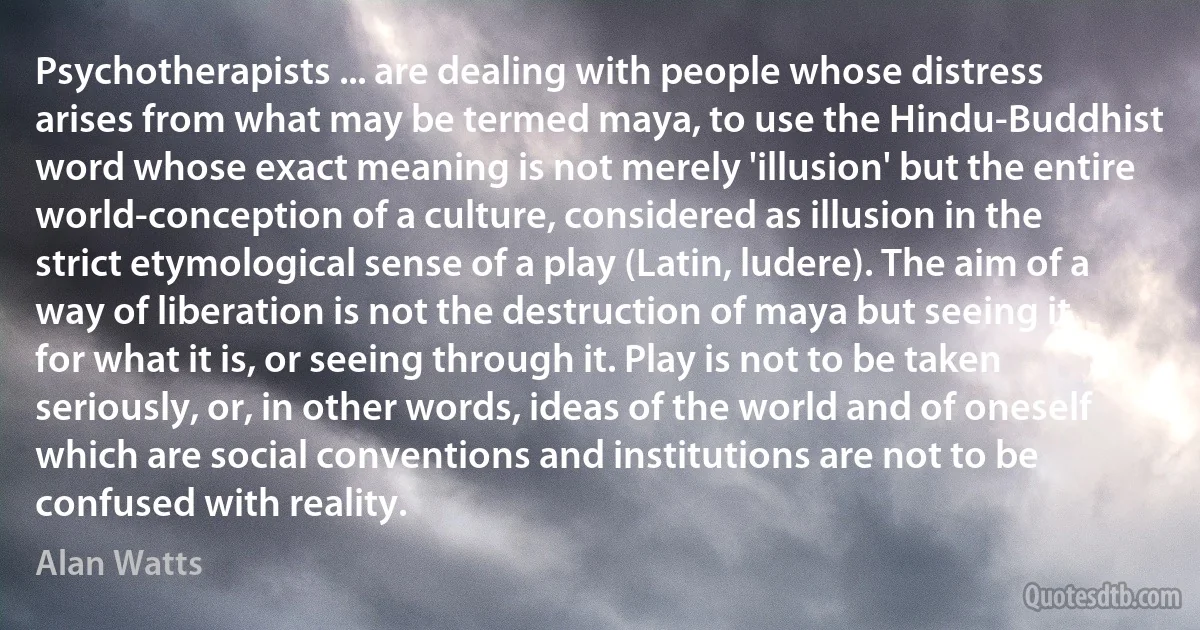Maya Quotes
The worst thing that can happen to advanced devotees who are fixed in Krishna consciousness is that they will go back to the spiritual world. Thus, they are enabled by calamitous situations to go back to Krishna more quickly. It is a part of the process of devotion that from time to time everyone must be tested in various ways. When we take to devotional service we are declaring war against Maya. We are on a battlefield, engaged in our own battle of Kuruksetra. We shouldn't read the Bhagavad-gita and think that it is merely some fascinating ancient history and philosophy. We should also understand that Arjuna is representing every person who is trying to take shelter of Krishna. Arjuna had to undergo bewilderment and serious choices, but Krishna was present to protect him.

Bhakti Tirtha Swami
Anthropologists visit the temple sites and read the inscriptions and make up stories about the Maya, but they do not read the signs correctly. Its just their imagination. Other people write about prophecy in the name of the Maya. They say that the world will end in December 2012. The Mayan elders are angry with this. The world will not end. It will be transformed.

Carlos Barrios
O Mother, I throw myself on Thy mercy; I take shelter at Thy Hallowed Feet. I do not want bodily comforts; I do not crave name and fame; I do not seek the eight occult powers. Be gracious and grant that I may have pure love for Thee, a love unsmitten by desire, untainted by any selfish ends - a love craved by the devotee for the sake of love alone. And grant me the favour, O Mother, that I may not be deluded by Thy world-bewitching māyā, that I may never be attached to the world, to "woman and gold", conjured up by Thy inscrutable māyā! O Mother, there is no one but Thee whom I mav call my own. Mother, I do not know how to worship; I am without austerity; I have neither devotion nor knowledge. Be gracious, Mother, and out of Thy infinite mercy grant me love for Thy Lotus Feet.

Ramakrishna
Nothing can be more untrue than to pretend that the general religious mind of India has not at all grasped the higher spiritual or metaphysical truths of Indian religion. It is a sheer falsehood or a wilful misunderstanding to say that it has lived always in the externals only of rite and creed and shibboleth. On the contrary, the main metaphysical truths of Indian religious philosophy in their broad idea-aspects or in an intensely poetic and dynamic representation have been stamped on the general mind of the people. The ideas of Maya, Lila, divine Immanence are as familiar to the man in the street and the worshipper in the temple as to the philosopher in his seclusion, the monk in his monastery and the saint in his hermitage. The spiritual reality which they reflect, the profound experience to which they point, has permeated the religion, the literature, the art, even the popular religious songs of a whole people.

Sri Aurobindo
The shifty language of politics,... that strange language full of Maya and falsities of self-illusion and deliberate delusion of others, which almost immediately turns all true and vivid phrases into a jargon, so that men may fight in a cloud of words without any clear sense of the thing they are battling for....

Sri Aurobindo
I had many doubts before. I was brought up in England amongst foreign ideas and an atmosphere entirely foreign. About many things in Hinduism I had once been inclined to believe that they were imaginations, that there was much of dream in it, much that was delusion and Maya. But now day after day I realised in the mind, I realised in the heart, I realised in the body the truths of the Hindu religion. They became living experiences to me, and things were opened to me which no material science could explain.

Sri Aurobindo
In fact, one of the main lesson to be learned from the collapses of the Maya, Anasazi, Easter Islanders, and those other past societies (as well as from the recent collapse of the Soviet Union) is that a society's steep decline may begin only a decade or two after the society reaches its peak numbers, wealth, and power. [...] The reason is simple: maximum population, wealth, resource consumption, and waste production mean maximum environmental impact, approaching the limit where impact outstrips resources. On reflection, it's no surprise that declines of societies tend to follow swiftly on their peaks.

Jared Diamond
Religious beliefs are counterfactual insofar as they are anomalous (e. g., God is gendered but sexless; Saturn devours his own children; lambs lie with lions), implausible (e. g., Athena bursts forth from Zeus's head; the Zai:rean Nkundo hero Lianja springs fully armed from the leg of his mother; Lao-Tse either emerges with his white beard from the left side of his mother, who bore him for eighty years, or is born immaculately of a shooting star), and, most significantly, counterintuitive (e. g., the Judea-Christian God is a sentient and emotional being with no body; Greek, Hindu, Maya, and Egyptian deities are half-human half-beast; the Chinese monkey god can travel thousands of kilometers at one somersault).

Scott Atran
We are all like fish that have separated from the sea of divine consciousness. For a person to be happy outside his or her natural relationship with God is like a fish trying to enjoy life outside of the water, on the dry sand. Holy people go to great extremes to help even one person to return his or her natural spiritual consciousness, to the sea of true joy. But the net of maya, or illusion, snatches away the minds of the masses, diverting us from the true self-interest.

Radhanath Swami
So, too, in the Vedanta the whole world is seen as the lila and the maya of the Self, the first word meaning "play" and the second having the complex sense of illusion (from the Latin ludere, to play), magic, creative power, art, and measuring-as when one dances or draws a design to a certain measure. From this point of view the universe in general and playing in particular are, in a special sense, "meaningless": that is, they do not-like words and symbols-signify or point to something beyond themselves, just as a Mozart sonata conveys no moral or social message and does not try to suggest the natural sounds of wind, thunder, or birdsong.

Alan Watts
The Buddhist doctrine of impermanence includes the notion that there is no self... It holds that the idea of a separate, individual self is an illusion, just another form of maya, an intellectual concept that has no reality. To cling to this idea of a separate self leads to the same pain and suffering (duhkha) as the adherence to any other fixed category of thought.

Fritjof Capra
I feel the hot winds of karma driving me. Nevertheless I remain here. My training was correct: I must not shrink from the clear white light, for if I do, I will once more re-enter the cycle of birth and death, never knowing freedom, never obtaining release. The veil of maya will fall once more.

Philip K. Dick

![Whatever plane our consciousness may be acting in, both we and the things belonging to that plane are, for the time being, our only realities. As we rise in the scale of development we perceive that during the stages through which we have passed we mistook shadows for realities, and the upward progress of the Ego is a series of progressive awakenings, each advance bringing with it the idea that now, at last, we have reached "reality"; but only when we shall have reached the absolute Consciousness, and blended our own with it, shall we be free from the delusions produced by Maya [illusion]. (Helena Petrovna Blavatsky)](https://cdn.quotesdtb.com/img/quotes_images_webp/02/helena-petrovna-blavatsky-absolute-369102.webp)

